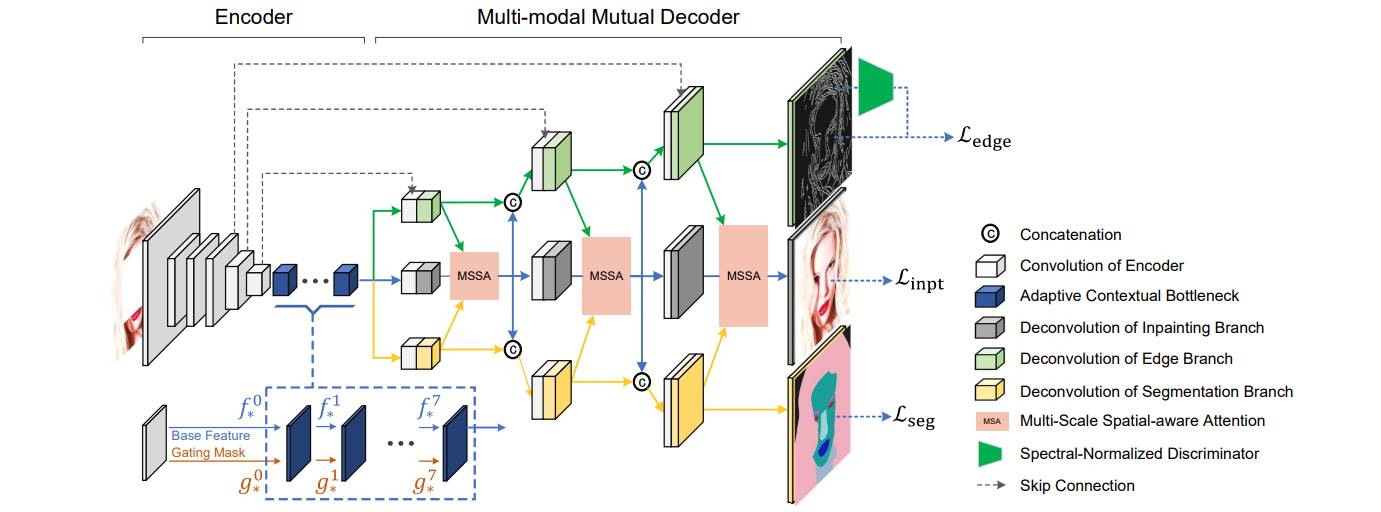This official repository implements MMT (Unbiased Multi-Modality Guidance for Image Inpainting) using PyTorch 1.8.0
- Python 3.8.8
- Pytorch 1.8
- NVIDIA GPU + CUDA cuDNN
pip install -r requirements.txt
It assumes all datasets placed in the data_root "../training_data/" .
1. RGB images
| dataset | DATANAME | number of semantic categories | source |
|---|---|---|---|
| CelebA-HQ | CelebAMask-HQ | 15 | https://github.com/switchablenorms/CelebAMask-HQ |
| Outdoor Scenes | OST | 9 | http://mmlab.ie.cuhk.edu.hk/projects/SFTGAN/ |
| CityScapes | CityScape | 20 | https://www.cityscapes-dataset.com |
Downloading RGB image datasets from above links. Then split to train/test set, then place them to f"../training_data/{DATANAME}/img/train/" or f"../training_data/{DATANAME}/img/test/" .
2. Edge maps
Run python utils/generate_canny_edge.py to pre-generate edge maps for corresponding RGB images. Placing them to f"../training_data/{DATANAME}/edge/train/".
Optional:
In code dataset.py, note off the skimage-canny comments line for generate corresponding edge maps while sample RGB data.
3. Segmentation maps
Three datasets contain own hand-crafted segmentation maps. Except CelebA-HQ that we merge all left and right parsing, e.g., left eye and right eye => eyes, we remain the original setting of segmentation of OST and CityScapes.
Generation script for splicing parsing of CelebA-HQ is utils/generate_face_parsing.py and splicing parsing of CityScapes is utils/generate_cityscape_parsing.py. OST already provides spliced parsing PNG images. Notably, all segmentation maps of three datasets are converted to one-hot format that save as *.npy for training.
If this is still holding you back, please feel free to download pre-generated segmentation maps on google drive (named anno_*.tar.gz).
Similar to RGB images and edges, place segmentation maps to f"../training_data/{DATANAME}/anno/train/" .
4. About dataset split
- OST includes 9900 training images and 300 testing images.
- In CityScapes dataset, 2975 images from the training set and 1525 images from the test set for training, and test on the 500 images from the validation set.
- CelebA-HQ includes 30000 images, use the first 29000 images for training, and use the last 1000 images for testing.
To perform training, use
python train.py
There are several arguments that can be used, which are
--dataset +str #DATANAME, one of CelebAMask-HQ, OST, CityScape
--data_root +str #DATASETS DIR
--num_iters +int #TRAINING ITERATION, no need changing
--batch_size +int #scale memory for your device
--gpu_id +str #which gpu to use
--auxiliary_type +str #NETWORK TYPE, no need changing
--local_canny_edge +str #EDGE LABEL, switch generate method of edge label
| Pretrained Weights |
|---|
| CelebA-HQ |
| OST |
| Cityscape |
To quick test, use
python test.py --ckpt checkpoint/MMT-CelebAHQ.pth
There are several arguments that can be used, which are
--dataset +str #DATANAME, one of CelebAMask-HQ, OST, CityScape
--data_root +str #DATASETS DIR
--mask_root +str #local mask files
--save_root +str #inference results dir
--mask_mode +str #MASK TYPE
--ckpt +str #pretrain weights location
--verbose #output predicted segmentation and edge
Tips:
- Masks should be binarized when change scale.
PIL.Image.open(mask_path).convert('1').resize((h,w)) - We retrained the model on another device, so that the results may slightly differ from the reported ones.
- Release training code
- Release testing code
- Release pre-trained model of CelebA-HQ
- Release pre-trained models of OST, Cityscapes
- Release a web demo
Please cite this project in your publications if it helps your research. The following is a BibTeX reference.
TBA
We thank the authors of RFR-Net and STTN for sharing their codes.
